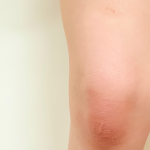What is jaw dislocation?
Jaw dislocation is when the lower part of the jaw (mandible) moves out of its normal position. It usually heals well, but it can cause problems in future. If you dislocate your jaw, seek medical help as soon as possible and never try to put a dislocation back in place yourself.
The lower part of the jaw is connected to the skull by joints just in front of each ear, called the temporomandibular joints (TMJ). A dislocated jaw occurs when the lower part of the jaw is pulled away from one or both of the TMJs. Even if it pops back in, it can still cause pain and other problems.
What are the symptoms of a dislocated jaw?
The main symptoms of a dislocated jaw include:
- pain in the TMJ joint that gets worse when you move your jaw
- changes to your bite — your teeth don’t line up properly
- problems with talking
- being unable to move the jaw or close your mouth properly
- difficulty speaking or swallowing
- drooling
- a ‘locked’ jaw, or a jaw that juts out
A dislocated jaw can affect eating and sleeping. Your jaw may also feel stiff, swollen and sore.
What causes a dislocated jaw?
Jaw dislocation is usually the result of an injury, such as when someone hurts their face by falling or if they are in a vehicle accident. Sometimes, it can happen because they open their mouth too wide such as when they are eating, yawning, vomiting or having a dental procedure.
A condition called temporomandibular joint dysfunction can cause pain, abnormal jaw movements and joint noises.
When should I see my doctor?
Seek medical attention straight away if you think you have a dislocated jaw. The sooner you see a doctor, the better, since this will reduce the chances of future complications.
On the way to hospital, hold the jaw in place with your hand or with a loose bandage. Don’t make the bandage too tight — you should be able to remove it easily in case you vomit.
You should also see a doctor if you:
- are not sure if your jaw is dislocated
- have pain and tenderness in your jaw that doesn’t go away
- can’t open or close your jaw completely
How is a dislocated jaw treated?
Your doctor will diagnose a dislocated jaw with a physical examination and an x-ray. They will move the joint back into its correct position either manually or occasionally during surgery. You may have an anaesthetic so you don’t feel any pain, and medicines to relax your muscles so the jaw can be moved back into place properly.
Once your jaw is back in place, it will need to be kept stable with bandages that prevent you from opening your mouth too wide. You can control pain with medicines and a cold pack for 10 to 20 minutes at a time every 2 to 3 hours. Eat soft foods so you don’t have to move your jaw too much to chew.
You should not open your mouth wide for about 4 weeks after you have dislocated your jaw. Support your jaw in your hand every time you sneeze or yawn during this time.
Can a dislocated jaw be prevented?
Use a mouth guard, helmet or other safety equipment to protect your face during sport.
If you’ve had a dislocated jaw in the past, take extra care not to yawn too widely. While it’s often impossible to stop a yawn, try keeping your tongue touching the roof of your mouth while you yawn, to keep your mouth partly closed.


